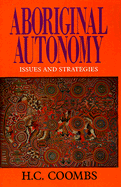Book contents
- Frontmatter
- Contents
- Foreword by Michael Dodson
- Preface
- Acknowledgments
- The Aboriginal World View
- Aborigines and the Land
- Aboriginal Lifestyles
- Aborigines, Resources and Development
- 8 The ideology of development in the East Kimberley
- 9 Aborigines and resources: from ‘humbug’ to negotiation
- 10 The McArthur River development: a case in point
- Aborigines, Law and the State
- Asserting Autonomy: Recent Aboriginal Initiatives
- The Recognition of Native Title
- Conclusion
- Appendix: The Eva Valley Statement
- References
- Select Bibliography of work by H.C. Coombs
- Index
10 - The McArthur River development: a case in point
Published online by Cambridge University Press: 03 May 2011
- Frontmatter
- Contents
- Foreword by Michael Dodson
- Preface
- Acknowledgments
- The Aboriginal World View
- Aborigines and the Land
- Aboriginal Lifestyles
- Aborigines, Resources and Development
- 8 The ideology of development in the East Kimberley
- 9 Aborigines and resources: from ‘humbug’ to negotiation
- 10 The McArthur River development: a case in point
- Aborigines, Law and the State
- Asserting Autonomy: Recent Aboriginal Initiatives
- The Recognition of Native Title
- Conclusion
- Appendix: The Eva Valley Statement
- References
- Select Bibliography of work by H.C. Coombs
- Index
Summary
Edited version, unpublished paper originally presented at the Centre for Aboriginal and Islander Studies, Northern Territory University for the 20th anniversary of the North Australian Research Unit, Australian National University, Darwin (1993).
ISSUES OF CONCERN
At the conclusion of a comprehensive, multidisciplinary study of the impacts of resource development on Aboriginal communities in the East Kimberley region, the project researchers recommended that:
Approval of any proposal to exploit exhaustible natural resources should be dependent on evidence that a significant proportion will flow to the East Kimberley region and will be available as capital for sustainable enterprises there and in the Australian economy generally.
(Coombs et al. 1989)In stark contrast to this recommendation, the discussions following the High Court's judgement on the Mabo case have almost exclusively been conducted with a view to establishing the effect of native title upon the mining industry. This single-issue focus has had the result that many other concerns, both environmental and social, have been ignored in the process. This is clearly evident in circumstances surrounding the McArthur River mine development, near the settlement of Borroloola in the Northern Territory Gulf country, where Mount Isa Mines plan to exploit massive lead and zinc deposits. Reports of preliminary discussions between Aboriginal land owners and government and community lawyers, have led to the provisional conclusion that an agreement with the company could be possible without requiring extinguishment of native title.
- Type
- Chapter
- Information
- Aboriginal AutonomyIssues and Strategies, pp. 111 - 116Publisher: Cambridge University PressPrint publication year: 1994



